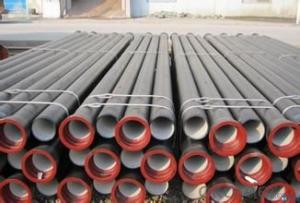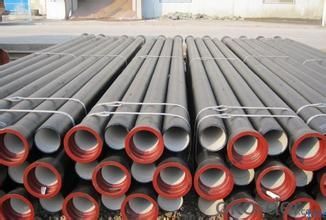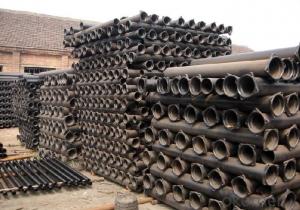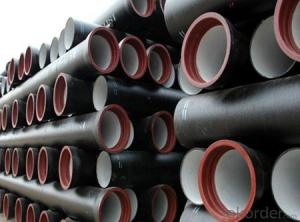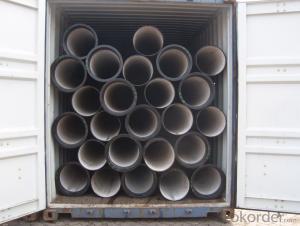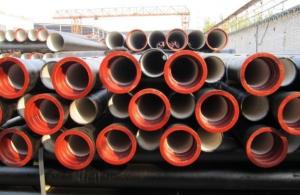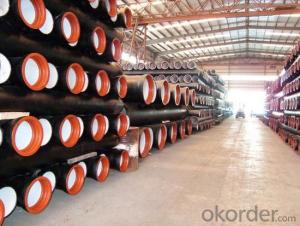Ductile Iron Pipe EPDM Rubber DN300 EN598
- Loading Port:
- China main port
- Payment Terms:
- TT or LC
- Min Order Qty:
- 1000 m
- Supply Capability:
- 600000 m/month
OKorder Service Pledge
OKorder Financial Service
You Might Also Like
1. Ductile Iron Pipe Description :
It has high strength & hardnes as steel and better corrosin resistance than steerl and grey iron, I ductile iron pipe is the ideal substute for gray cast iron pipe and common steel pipe. In addition, our DI pipes are produced with good straightness, identical wall thickness, high dimension accuracy, smooth surface finished, remarkable mechanical properties and firmly sticking internal & external coating layer as well. Flexible Push-in joint and rubber gasket are used for more convenient installation of pipelines.
2. Ductile Iron Pipe Main Features:
1. ISO 2531 or EN 545 Standard K9 Class, K7 Class and C Class
2. ISO 9001 Certificate
3. ISO 2531 & EN 545 Certificate
4. WRAS Potable Water Certificate for Cemen Internal Lining
5. WRAS EPDM Rubber Gasket or NBR Rubber Gasket
6. DN80mm - DN2600mm
7. Black Bitumen or Blue Epoxy Coating
8. Lengh = 6m or cut into 5.6m, 5.7m, 5.8m
9. Client's Brand Customization Allowable
10. Container or Bulk Loading / Shipping
3.Ductile Iron Pipe Images:
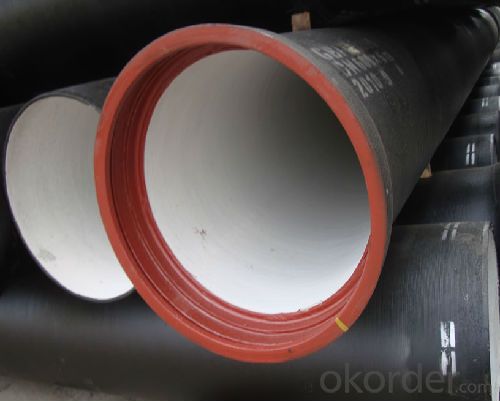
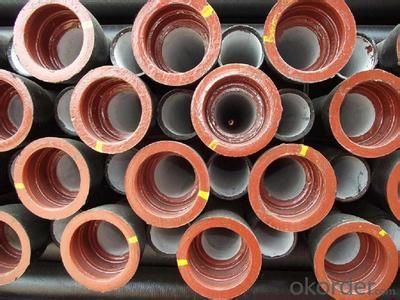
4.Ductile Iron Pipe Specification:
1) The standard of pipe: ISO2531:1998, K9
2) Effective length: 6m
3) Inner cement line: Portland cement line as per ISO4179
4) Zinc coating: at least 130g/m2 as per ISO8179
5) Bitumen painting: at least 70um as per ISO8179
6) With 100% quantity of NBR ring, or SBR ring, or EPDM ring as per ISO4633
7) DN80mm-800mm
5.FAQ:
Here some questions always been asked
· Industry experience over 20 years.
· Management Systems-Internal Software
· Finished Product Inventory-More Than 5000 Tons.
· Raw Material inventory -Over 8000 Mertic Tons.
· The most convenient transport and prompt delivery.
· Competitive price with best service .
· High technical production line with top quality products.
· High reputation based on best quality products.
- Q: What are the different types of ductile iron pipe joints?
- There are several different types of ductile iron pipe joints commonly used in various applications. These joints are designed to provide a strong and reliable connection between pipes, ensuring efficient fluid transfer and preventing leaks. Some of the most common types of ductile iron pipe joints include: 1. Push-on Joint: This type of joint is easy to install, as it does not require any special tools or equipment. The spigot end of one pipe is inserted into the bell end of another pipe, creating a tight seal. A rubber gasket is usually used to enhance the joint's resistance to leaks. 2. Mechanical Joint: Mechanical joints are commonly used in water and wastewater applications. They consist of a gland, a rubber gasket, and a follower gland. The pipe ends are pushed into the gland, and the follower gland is tightened, compressing the rubber gasket and creating a secure connection. 3. Restrained Joint: Restrained joints are specifically designed to withstand high internal and external forces such as water pressure or soil loadings. These joints typically use a rubber gasket and a restraining mechanism, such as a bolt or wedge, to prevent the pipe from moving or separating under stress. 4. Flanged Joint: Flanged joints are commonly used in large diameter pipes or applications requiring frequent disassembly. Each pipe end is equipped with a flange, which is then bolted together with the use of gaskets to create a strong connection. Flanged joints provide easy access for maintenance or repairs. 5. Welded Joint: Welded joints involve heating the pipe ends and fusing them together to form a permanent connection. This type of joint is commonly used in high-pressure applications where a reliable and leak-free connection is crucial. Welded joints require skilled labor and specialized equipment. It is important to choose the appropriate type of joint based on the specific application, pipe size, and operating conditions to ensure the integrity and longevity of the ductile iron pipe system. Consulting with a professional engineer or pipe manufacturer can help determine the most suitable joint for a particular project.
- Q: Fire water supply network adopts ductile iron pipe, the test pressure should be no more than MPa
- Strictly speaking: the outer pipe network and the internal pipe network are the same. Minimum fire 1.0MPa, minimum sprinkler 1.4MPa. Because not only in accordance with the water pump, but also take into account the pressure on the fire engine.
- Q: What are the specifications of cast iron pipes?
- Compared with grey cast iron pipe, ductile iron pipe has higher strength, better toughness, thinner tube wall, less metal consumption, and can bear higher pressure. The effective length is 5 meters and 6 meters. According to the wall thickness, it is divided into two grades P and G. It is the development direction of cast iron pipe.
- Q: Can ductile iron pipe be used for water treatment plants?
- Yes, ductile iron pipe can be used for water treatment plants. Ductile iron pipe is a commonly used material in the water industry due to its strength, durability, and corrosion resistance. It is suitable for various applications, including transporting water in water treatment plants. Ductile iron pipe can withstand high pressure and is well-suited for underground installations. It also has excellent resistance to corrosion from water and chemicals commonly used in water treatment processes. Additionally, ductile iron pipe is easy to install and maintain, making it a preferred choice for water treatment plants. Overall, ductile iron pipe is a reliable and cost-effective option for water transport in water treatment plants.
- Q: How do ductile iron pipes perform in high-altitude areas?
- Ductile iron pipes perform well in high-altitude areas as they are highly resistant to corrosion and can withstand extreme temperature variations. The material's flexibility and strength make it suitable for handling increased pressure caused by altitude changes, ensuring reliable water distribution systems even in mountainous regions.
- Q: Can ductile iron pipe be used for oil and gas pipelines?
- Yes, ductile iron pipe can be used for oil and gas pipelines. Ductile iron pipe is known for its strength, durability, and corrosion resistance, making it suitable for a variety of applications including oil and gas transportation. It has been widely used in the industry for many years and has proven to be a reliable choice for pipeline systems. Additionally, ductile iron pipe can handle high pressure and heavy loads, making it suitable for the demands of oil and gas pipelines. However, it is important to ensure that the specific grade and specifications of the ductile iron pipe meet the requirements of the particular oil and gas project to ensure optimal performance and longevity.
- Q: How are ductile iron pipes protected against root intrusion?
- Diverse techniques and methods exist to safeguard ductile iron pipes from root intrusion. The application of root inhibitors or growth regulators is a commonly employed approach. These substances are typically injected into the surrounding soil, forming a barrier that restricts root growth near the pipes. This effectively prevents roots from penetrating the pipes and causing damage. Another method involves the utilization of physical barriers like root barriers or sleeves. These barriers are installed around the pipes to physically obstruct root access. Root barriers are typically constructed from materials such as plastic or metal, engineered to withstand the pressure exerted by growing roots. In addition, regular maintenance practices like periodic inspections and cleaning play a crucial role in preventing root intrusion. By consistently monitoring pipe conditions and removing any existing root masses, the risk of further intrusion can be minimized. It is important to recognize that preventative measures are more effective than reactive measures in protecting ductile iron pipes from root intrusion. Therefore, implementing proactive strategies during the installation phase, such as proper pipe bedding and alignment, can significantly reduce the likelihood of intrusion. Overall, a combination of chemical treatments, physical barriers, and appropriate maintenance practices greatly enhances the protection of ductile iron pipes against root intrusion, ensuring their long-term durability and functionality.
- Q: Are ductile iron pipes suitable for deep burial installations?
- Indeed, deep burial installations can accommodate ductile iron pipes. These pipes possess remarkable strength and endurance, rendering them highly suitable for subterranean purposes. They possess the ability to withstand the immense pressure exerted by soil as well as any external forces that may arise. Moreover, ductile iron pipes exhibit exceptional resistance to corrosion, a vital characteristic for ensuring long-lasting performance in buried settings. Furthermore, their flexibility enables them to endure ground movements and settle without fracturing. All in all, ductile iron pipes represent a dependable and economically efficient option for deep burial installations.
- Q: What are the advantages of using ductile iron pipe?
- Using ductile iron pipe in various applications offers several benefits. Firstly, ductile iron pipe is renowned for its strength and durability. It possesses higher tensile and yield strengths compared to other pipe materials, making it highly resistant to cracking, bending, and breaking. This exceptional strength enables the pipe to withstand high-pressure and heavy-load conditions, making it an ideal choice for applications such as water and sewage systems, oil and gas pipelines, and industrial piping. Secondly, ductile iron pipe exhibits excellent corrosion resistance. It is coated with a protective layer, typically zinc or epoxy, which prevents rusting and corrosion. This coating ensures a longer lifespan for the pipe, even in harsh environments or when transporting corrosive fluids. Another advantage of ductile iron pipe lies in its flexibility. Unlike rigid pipes, ductile iron pipes possess a certain level of flexibility, enabling them to endure ground movements and settle without fracturing. This flexibility proves particularly advantageous in areas prone to earthquakes or soil settlements. Additionally, ductile iron pipe boasts a smooth inner surface, minimizing flow resistance and enhancing fluid transportation efficiency. It also reduces the likelihood of sediment accumulation or corrosion within the pipe, resulting in improved flow rates and decreased maintenance requirements. Furthermore, ductile iron pipe proves cost-effective in the long run. Although it may entail higher initial costs compared to other pipe materials, its durability and minimal maintenance needs make it a cost-effective choice over time. The extended lifespan of ductile iron pipe reduces the necessity for frequent replacements and repairs, contributing to lower overall life-cycle expenses. Lastly, ductile iron pipe exhibits environmental friendliness. It is manufactured using recycled materials, and its extended lifespan diminishes the need for frequent replacements, thereby reducing the carbon footprint associated with manufacturing and transportation. In conclusion, the utilization of ductile iron pipe offers numerous advantages, including exceptional strength, corrosion resistance, flexibility, smooth inner surface, cost-effectiveness, and environmental friendliness. These qualities establish it as a reliable and preferred option for various applications across diverse industries.
- Q: What is the weight of a typical ductile iron pipe?
- The weight of a typical ductile iron pipe can vary depending on size and wall thickness. Ductile iron pipes are generally available in sizes ranging from 3 inches to 64 inches in diameter. The weight of these pipes can range from a few pounds per foot for smaller sizes to several hundred pounds per foot for larger diameters. Additionally, wall thickness plays a significant role in determining the weight of the pipe. Thicker walls will result in a heavier pipe. For example, a 10-inch ductile iron pipe with a wall thickness of 0.25 inches may weigh around 26 pounds per foot, while a 24-inch ductile iron pipe with a wall thickness of 0.5 inches can weigh approximately 175 pounds per foot. To determine the precise weight of a specific ductile iron pipe, it is essential to consult specific manufacturer specifications or engineering references.
Send your message to us
Ductile Iron Pipe EPDM Rubber DN300 EN598
- Loading Port:
- China main port
- Payment Terms:
- TT or LC
- Min Order Qty:
- 1000 m
- Supply Capability:
- 600000 m/month
OKorder Service Pledge
OKorder Financial Service
Similar products
Hot products
Hot Searches
Related keywords
